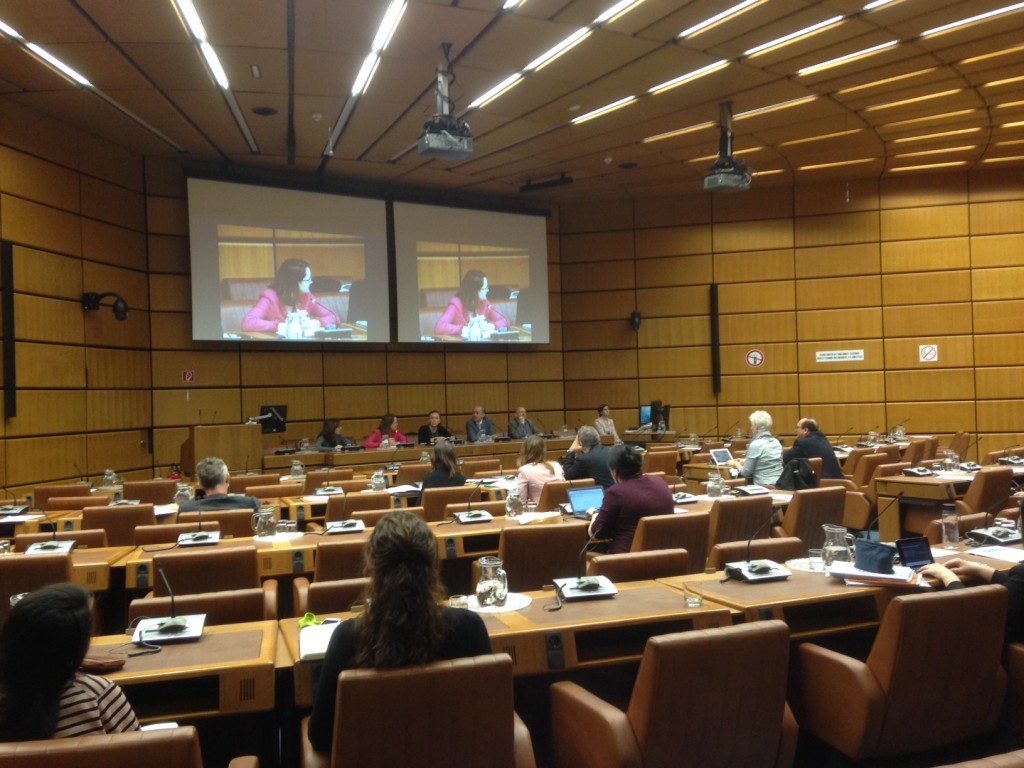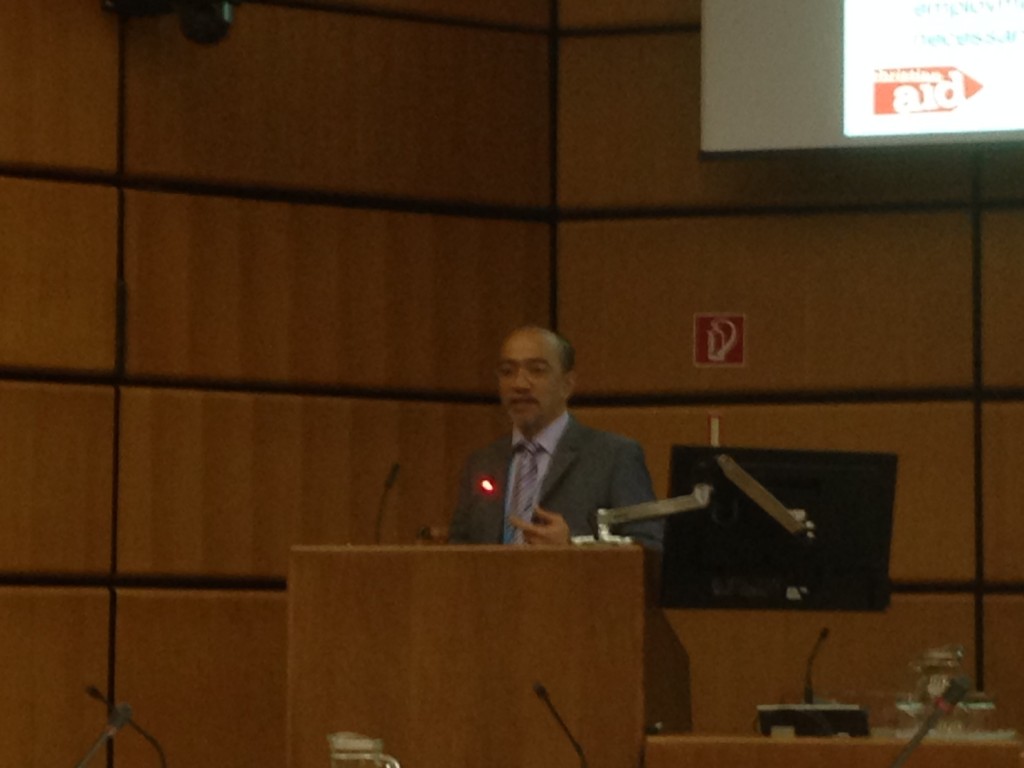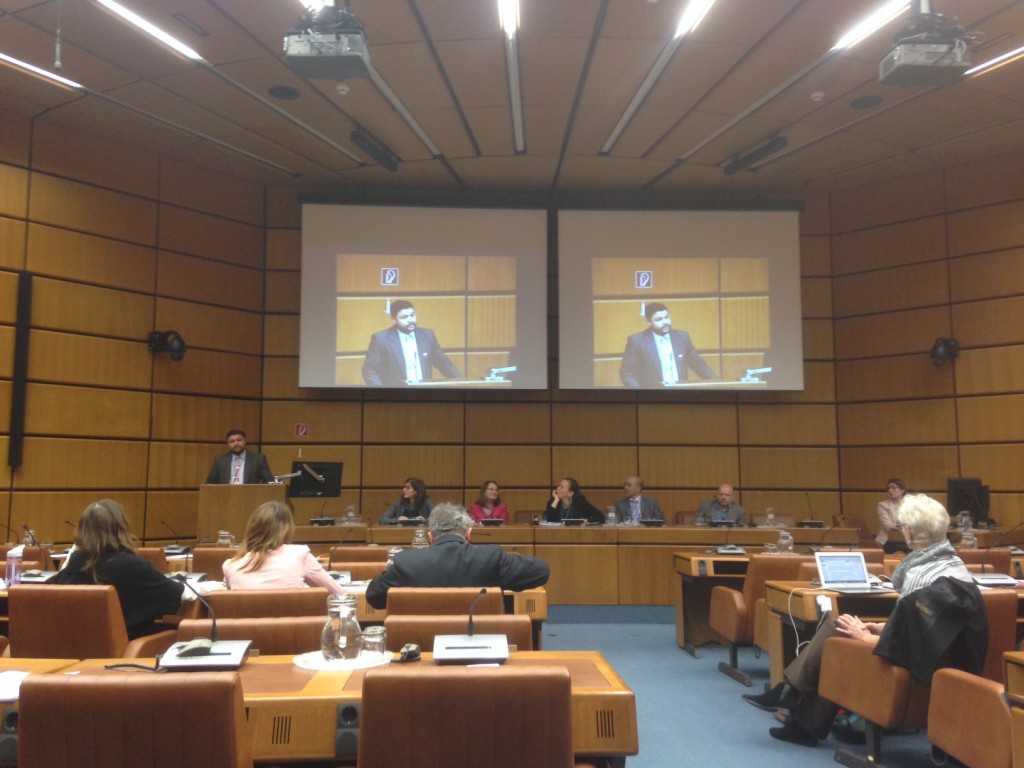Side event organised by Colombia, Norway, Christian Aid and the International Drug Policy Consortium
Ann Fordham, International Drug Policy Consortium – We welcome the launch of the Christian Aid report on the impact of drugs and drug policy on development and governance.
Bente Angell-Hansen, Ambassador, Embassy of Norway in Vienna – Given the hostile environment, eg. with organized criminal activity, you have been very brave in doing this research. The results are chilling. There is a lot of corruption, people in high levels involved in drug markets. Looking at drug problem as a pyramid, prisons are overcrowded from the lowest part of this pyramid while we are not sufficiently able to address and target those who are the main actors in this market, and to support those in the lowest part. The case studies shown in this report show the diversity of the problem, shows the history and culture, respect for women, role of women, all of these things. We need to bear these in mind when looking into the toolbox on how best to address this problem. We see that those who are mostly suffering are very poor people, who are looking for livelihoods that don’t have other alternatives. Methods used to coerce people into becoming a part of the drug economy. Interesting to read how this illicit economy is now becoming part of licit economy. How should donors such as Norway react and address this in our own development policies? This problem is not much in our focus. We see here in this report that we have a huge impediment to reaching out SDGs in a transparent, democratic, human rights approach where governance is very much at the core. If we don’t go about this in a good way we will cause a lot of collateral damage. There is no quick fix.
We also have this data from UNODC, depressing to read, how this problem is on the rise, becoming more complex, becoming linked to terrorism, eg. in African countries. In my previous job, a group in Somalia attacked a power plant and caused loss of life, and we see this happening again in Mali. This is a very urgent matter, requires resources, vision, bravery, and in-depth knowledge that you have provided in this report. Thank you for showing what we can do with civil society.
Eric Gutierrez, Senior Adviser on Accountable Governance, Christian Aid – The reports were a 2 year research project. We have the report and 4 case studies: Tajikistan, Colombia, Mali and Afghanistan. ChristianAid is a development agency and realized that we had no understanding of illicit drugs economy. We realized that many of the poor families we were seeking to help were surviving not on our development projects but on engaging in illicit drug markets. Another reason we did this research is because the scale of this illicit economy can no longer be ignored, and its affects on employment, land and the environment.
Why case studies on drugs? Aid recognised that it has no systematic understanding of how the illicit economy affects poverty eradication and governance. In addition, the scale and complexity of illicit commerce could not anymore be ignored – it shapes the creation of jobs; determines access to land and markets; affects public services; drives cross-border financial flows; and influences political decision-making. As a start, we decided to narrow our focus on the illicit commerce in drugs. Many poor households we support survive not because of our development projects, but because they plant opium or coca, for which they get not only a good a price, and but often, also protection. The prevailing counter-narcotics narrative treats the illicit commerce in drugs as a separable problem, like a ‘malignant tumour’ that can be surgically removed from a healthy body. But law enforcement could not be the only cure; and metrics being used are quite limited. We questioned the assumptions of stripped down, quantitative measurement. We wanted to dig deeper into the messy and complex contexts, which we believe will complement the metrics. This brought us to five difficult questions.
Question 1: In a messy and complex context, how do we help poor people move out of the illicit economy without inadvertently making things worse? The Afghanistan case study shows how a successful development intervention in poppy-growing Helmand Province exacerbated the problem and further displaced the land-poor.
Question 2: How can we best respond to the fact that poor people need protection from violence, and the only way that many can get it is by being complicit in illicit trades? If a poor farmer’s goat is stolen or forcibly taken, who does he go to for help to get it back? Usually not the police, but someone who can compel obedience from the perpetrator. This is how relationships of interdependency typically begin.
Question 3: But what if poor people participate in what they themselves admit to be criminal activity – i.e. they participate out of greed, not need? The emergence of Cocainebougous – luxury mansion districts in the deserts of Mali – demonstrates that to many local people, illicit commerce is alternative development. Distinctions invisible to outsiders, such as halal and haram forms of smuggling, emerge. When even notorious drug smugglers invest their gains in widely-recognised symbols of legitimacy – marriage; gardens, livestock, and vehicles; or the creation of employment – even haram activities get to be seen as a necessary means to achieve a moral lifestyle.
Question 4: What happens when the recognised government loses legitimacy, while illicit actors provide security and stability? The Tajikistan case study shows that the commerce in heroin – usually regarded as a sign of state weakness, a source of conflict and violence, and a cause of corruption and bad governance – has arguably turned into a source of stability.
Question 5: What if the illicit actors become legitimate, and in some cases, are good for the economy and stability? Criminals can operate their enterprise like a family business; build networks based on patronage and loyalty; forge alliances with public officials; or create Robin Hood-type reputations. Unpublished case study on Burma shows how drug lords were ‘pillars of the economy’. Colombia case study shows that outlaws are not ‘outsiders’, but are actually ‘insiders’. There is no clear divide between licit and illicit.
Next steps:
- There is no ‘silver bullet’; need for more conversations/analyses, including dialogue between law enforcement and development agencies
- Development agencies need to resolve their dilemmas in the provision of protection
- Counter-narcotics ‘alternative development’ needs to be challenged.
- Policy options are not just prohibition and legalisation.
- A gender analysis is needed.
Ann Fordham, International Drug Policy Consortium – thank you for your courage in bringing out this report. These perspectives are rarely brought up in this setting at CND, and I hope this is the beginning of an expanding dialogue on the topic.
David Mansfield, Consultant on drugs and development – When Eric asked me to do one of these case studies, it was cathartic, it was crazy that others couldn’t see that this was a problem in Afghanistan. It isn’t discussed at all, eg. recent World Bank report on poverty with no mention of drugs. We still have this situation where development donors are not engaging on drug issues. I will talk about this policy of disengagement. During the time of transition, development donors didn’t want to talk about drugs, nor did Afghan political leaders, as a win didn’t seem possible in this area. Why have development donors proven reluctant to engage? There has been a confluence of interests amongst development agencies to discuss this issue but then it goes away, eg. with staff turnover.
The illicit drugs economy has worked for Afghanistan in some ways, eg. providing livelihoods for farmers, employment. There is large swathes of desert land, 250,000 ha., that is now agricultural land because of opium cultivation. If drugs were legal this wouldn’t have happened, it has only happened because of premium value of illicit drug economy. So why are we trying to stop something that works?
The response of drugs community is alternative development. In context of Afghanistan, this has been a major issue. It was seen often as crop substitution, and projects were owned by UNODC who is not a development agency, and often coercive. It was about one donor funding health and another funding education, so the concept of AD was not appropriate for Afghanistan. As a result the concept ‘alternative livelihoods’ was adopted, coming out of my agency – not my preferred term but it was seen as necessary to communicate the idea to the US.
There was a constant debate about why farmers were always poor. UNODC data didn’t help discussion on this. It gave the idea that farmers were from the wealthy south not the poor north, as a result development donors didn’t see it as necessary to engage in opium cultivation issue because they didn’t need to help the rich.
While there are problems amongst development donors, but also amongst drug control officials, especially in relation to the data (eg. income data), and language used, eg. farmers are portrayed as having a choice on growing poppy or not when in reality, they don’t.
We haven’t done well in selling this issue as a development one to donors. It is often seen as a law enforcement issue, and problematic as it involves coercive elements such as eradication, and lack of government commitment. We don’t lack commitment on drug use issues, but we do on drug supply issues.
I think there can be a paradigm change. The SDGs are fundamental, if drugs are placed in context of SDG goals, then UNODC will have to aim to achieve development objectives as well. Other UN agencies must then engage too, eg. World Bank, UNDP. UNGASS can also be used as opportunity to frame drugs as a development issue, built into national development plans. How can this issue be ignored when it is such a fundamental part of the economy, as in Afghanistan? A lot of these issues exist in grey areas, but we will have to learn to live in those areas instead of pretending they don’t exist.
Angela Me, Chief, Research and Trend Analysis Branch, UNODC – We are now researching the issues of development and drugs, planning for the next World Drug Report to focus on the SDGs. David said that SDGs give us a new paradigm for discussing drugs. Indeed, it gives us a new framework to discuss social and economic development and environmental sustainability as well.
The analytical framework for our research now puts sustainable development at the centre, and looking at the impact on socio-economic development, partnerships, justice and the environment. We need to understand the linkages between these areas in order to address drug challenges. At same time, we need to understand impact of drug supply and drug use on development, eg. drug cultivation can lead to deforestation. What about impacts on social institutions and justice? This analytical framework also looks at how development can shape drug policy?
Some advocates really want to show negative impact of drug policies on development. We want to recognise the complexities in this area. There hasn’t been a lot of research and evidence on justice. There is a lot of advocacy on linkage between justice pillar and drug policy, so we have looked at linkages between homicide rates and quantity of cocaine trafficking in Latin America for example.
Last year one of our research reports looked at the impact of alternative development, and how it can contribute to changing a vicious circle into a virtuous circle in terms of falling drug production, poverty while licit economy grows, leading to healthier communities.
Javier Flores, Director of Drug Policy, Ministry of Justice of Colombia – I was a director of the illicit crop programmes, responsible for alternative development. I don’t believe in AD because I believe what we are doing is not enough because the people who live in cultivation parts of the country need more than we are giving with AD. AD is not going to be enough, never. This reality in Colombia and other countries led us to change our policies. Colombia thinks that we cannot continue doing the same things until now. We have done a lot of eradication and the problem is still there, a lot of fight against illicit actors and criminal organisations, and the problem is still there. Our consumption has increased a lot in the past 5 years. Now Colombia is not only a country with a production problem but now also a consumption problem. That changed our view in this global debate. We think very deeply that if we don’t change what we are doing the problem is going to increase and will never be finished. That is why we are here and that’s why for our President, ministry and everyone in government, changing drug policy is a priority. I’m glad to see here Cesar, an important leader of the farmers in our country. They know that things have to change, and we have to work together to do it. We understand AD as an important tool but we want to complement it with other things. We are working in a new structure, and trying to do more than AD. We have to bring public goods, health, education and justice into cultivation areas. This is the change we need. When that happens, we will probably see and feel different results in our territories and policies.
I want to thank Norway, UNODC, all of you for this invitation. AD is alternative to what? We have to change and think of another way to deal with this problem. And let’s not think this is a war we are facing.


